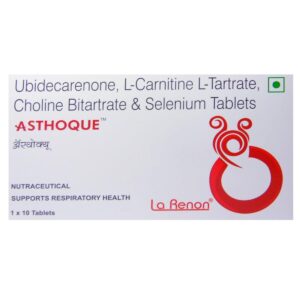L-CARNITINE + COENZYME Q10 + UBIDECARENONE
L-Carnitine: L-Carnitine is a dietary supplement that plays a crucial role in energy production in the body. It is primarily used to help people with certain genetic or medical conditions that prevent the body from naturally producing enough L-Carnitine.
The main mechanism of action of L-Carnitine involves its transportation of fatty acids into the mitochondria of cells. Once inside the mitochondria, fatty acids are then converted into energy through a process called beta-oxidation. This makes L-Carnitine essential for the metabolism of fatty acids, particularly long-chain fatty acids, which are the main source of energy for the heart and skeletal muscles.
L-Carnitine is available in various forms, including oral supplements, injectable solutions, and intravenous formulations. The dosage of L-Carnitine depends on the specific condition being treated. For example, for carnitine deficiency, the typical oral dose is 50-100 mg/kg/daily, while for exercise performance enhancement, the recommended oral dose is 2-4 grams per day.
When used as directed, L-Carnitine is generally considered safe and well-tolerated. However, like any supplement or medication, it can cause certain side effects. Some common side effects of L-Carnitine include nausea, vomiting, diarrhea, stomach cramps, and fishy body odor. These side effects are usually mild and temporary.
In rare cases, high doses of L-Carnitine or long-term use may lead to more serious side effects, such as muscle weakness, seizures, hypotension, an increased risk of bleeding, or an exacerbation of symptoms in individuals with certain metabolic disorders. It is important to consult with a healthcare professional before starting L-Carnitine supplementation to ensure proper dosage and minimize potential risks or interactions with other medications.
Coenzyme Q10: Coenzyme Q10 (CoQ10), also known as ubiquinone, is a naturally occurring compound found in every cell of the human body. It plays a vital role in the production of cellular energy and acts as an antioxidant to protect cells from damage. CoQ10 is available as a dietary supplement and is commonly used to support heart health, boost energy levels, and fight aging.
The exact mechanism of action of CoQ10 is not fully understood, but it is known to be involved in the electron transport chain, which is responsible for generating adenosine triphosphate (ATP), the main energy source for cells. Additionally, CoQ10 acts as a potent antioxidant, protecting cells from free radicals and oxidative stress.
The recommended dose of CoQ10 varies depending on the purpose of use. For general heart health, a typical dosage ranges from 100-300 mg per day. However, for individuals with specific health conditions, higher doses may be prescribed under medical supervision.
Coenzyme Q10 is generally safe and well-tolerated, with few reported side effects. Minor side effects may include gastrointestinal discomfort, nausea, and diarrhea. However, these side effects are usually mild and temporary.
It is worth noting that CoQ10 may interact with certain medications, such as blood-thinners, beta-blockers, and chemotherapy drugs. Therefore, it is important to consult with a healthcare professional before taking CoQ10, especially if you have any underlying medical conditions or are taking other medications.
Overall, Coenzyme Q10 is a widely used supplement that supports cellular energy production, acts as an antioxidant, and promotes heart health. However, it is important to speak with a healthcare professional regarding the appropriate dosage and potential interactions with medications.
Ubidecarenone: Ubidecarenone, commonly known as Coenzyme Q10 or CoQ10, is a naturally occurring compound found in every cell of the human body. It plays a vital role in the body’s energy production process and acts as an antioxidant.
Use: Ubidecarenone is primarily used as a dietary supplement to treat various conditions, including cardiac conditions, mitochondrial disorders, and as an adjunct in cancer treatment. It is also used to improve exercise performance and reduce muscle damage in athletes.
Mechanism of Action: Ubidecarenone functions as a crucial electron carrier in the electron transport chain, which is involved in cellular respiration and the production of adenosine triphosphate (ATP). ATP is the energy currency of the cell and is required for various physiological processes. Furthermore, CoQ10 acts as an antioxidant, protecting cells from oxidative damage.
Dose: The recommended dosage of Ubidecarenone varies depending on the condition being treated. For general health support, a typical dosage ranges from 100 to 200 mg per day. Higher doses can be used for specific medical conditions, such as heart failure, where doses of 200 to 600 mg per day may be recommended. It is essential to follow the specific instructions provided by a healthcare professional or read the product label for appropriate dosage information.
Side Effects: Ubidecarenone is generally considered safe and well-tolerated when taken orally. However, some individuals may experience mild digestive disturbances, such as nausea, diarrhea, or stomach upset. Rarely, allergic reactions or skin rashes may occur. It is important to mention any adverse effects to a healthcare professional. Additionally, Ubidecarenone may interact with certain medications, such as blood thinners, so it is essential to consult a healthcare professional before starting supplementation.

